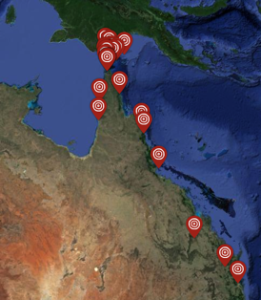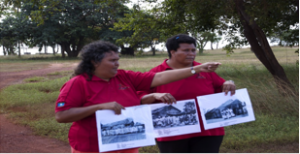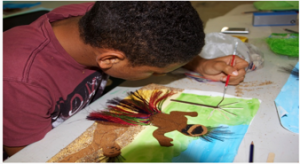In our study of tribal cultural institutions this semester, we have focused primarily on issues involving American Indians. In last week’s class, we delved into various international Indigenous issues. I could write a whole series of blog posts about the new insights gleaned in learning about the Sami, Métis, Māori, and Aboriginal Australian and Torres Strait Islander peoples. Instead, I’m going to focus on the latter group with what I thought was a striking example of government assistance that actually advocated for Indigenous cultural sovereignty support.
In 2002, the State Library of Queensland implemented an Indigenous Library Services Strategy which focused on the establishment of Indigenous Knowledge Centres (IKCs) in remote communities with high populations of Aboriginal people. The purpose of the IKCs was to improve public library services to these communities, generally increase Indigenous presence in libraries, and provide more employment and training opportunities for Indigenous people. By 2008, 17 IKCs had been established in partnership with Indigenous communities. Today there is a network of 22 IKCs across Cape York, the Northern Peninsula Area, the islands of the Torres Strait, and Central and South East Queensland, as illustrated in the map below.
 The Indigenous communities own and manage their IKCs, to serve as community spaces with traditional library services as well as culturally specific opportunities like language programs and museum preservation. The State Library of Queensland maintains long-term partnerships with the IKCs, so they not only provide funding for setup costs, but also for ongoing support through community training programs, preservation of local Indigenous Knowledge in oral and digital form and assistance in accessing cultural materials displaced in other cultural institutions worldwide. Below are staff at the Injinoo IKC providing a historical program.
The Indigenous communities own and manage their IKCs, to serve as community spaces with traditional library services as well as culturally specific opportunities like language programs and museum preservation. The State Library of Queensland maintains long-term partnerships with the IKCs, so they not only provide funding for setup costs, but also for ongoing support through community training programs, preservation of local Indigenous Knowledge in oral and digital form and assistance in accessing cultural materials displaced in other cultural institutions worldwide. Below are staff at the Injinoo IKC providing a historical program.
 This is a short video we watched in class that further depicts how the IKCs are serving the needs of the Aboriginal people in the way they want to be served and with the services they actually need to preserve their culture and tell their stories:
This is a short video we watched in class that further depicts how the IKCs are serving the needs of the Aboriginal people in the way they want to be served and with the services they actually need to preserve their culture and tell their stories:
It was refreshing to hear about positive interactions occurring between the government and Indigenous people of Australia, knowing that much like the American Indians, the Aboriginal people of Australia and the Torres Strait Islands have suffered—in many ways continue to suffer—the effects of European colonization. Many have lost connection to their language, culture, traditions, and land, so it is heartening to see a government seriously address Indigenous needs in an Indigenous space. The fact that these facilities are called “Indigenous Knowledge” Centres acknowledges the validity, importance, and cultural distinction of Indigenous knowledge. Below is an image of a youth participating in the “Cultural Love” program at an IKC, embracing culture through art.
 Reflecting on our own government and its relationship with American Indians, the efforts towards peace and forgiveness for wrongs done seem to be lacking in comparison. In 2008 the Australian Prime Minister Kevin Rudd issued a formal apology on behalf of all Australians for harm done to the Aboriginal people—something no leader in the United States has done to my knowledge. While an apology can’t erase or truly make up for the atrocities our government has committed, it would be a step in the direction of healing, to set a tone of compassion and cooperation for the future.
Reflecting on our own government and its relationship with American Indians, the efforts towards peace and forgiveness for wrongs done seem to be lacking in comparison. In 2008 the Australian Prime Minister Kevin Rudd issued a formal apology on behalf of all Australians for harm done to the Aboriginal people—something no leader in the United States has done to my knowledge. While an apology can’t erase or truly make up for the atrocities our government has committed, it would be a step in the direction of healing, to set a tone of compassion and cooperation for the future.
In the meantime, while we wait for our government to take such measures, it will have to be up to the rest of us to extend our humility and kindness to Indigenous communities and spread the word about Indigenous issues, ourselves.
-Carmella Hatch
Sources:
The images and much of the information about current IKCs were found on the State Library of Queensland’s blog, which is worth taking a look at. It has a number of different cultural resources and information about the IKCs. http://blogs.slq.qld.gov.au/ilq/2014/07/01/indigenous-knowledge-centres/
The rest of the information I sourced from the following reading for class. It provides a great overview of some of the other international Indigenous people we discussed in class. I highly encourage reading through it if you’re interested in learning more about those groups as well.
- Burns, K., Doyle, A., Joseph, G., Krebs, A. (2010). Indigenous Librarianship. In Encyclopedia of Library and Information Sciences (3rd ed., pp 2330-2346). Boca Raton, FL: CRC Press.
